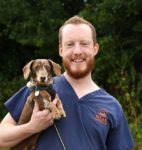Gut Matters: Gastrointestinal and pancreatic disease in dogs & cats
This veterinary thought exchange online tutored course takes a more detailed look at the investigation and management of gastrointestinal diseases in dogs and cats. Gastrointestinal diseases are common in small animal veterinary practice, but their investigation can be confusing and their management very challenging. What really is the microbiome and how much should I care? Why should we be stepping away from the omeprazole? Does inflammatory bowel disease really exist and what are the treatment options? Why is pancreatitis still such a challenge? We aim to answer all these questions and much more.
The course is run by our very own Scott Kilpatrick (EBVS and RCVS Recognised Specialist in Small Animal Internal Medicine). The course runs over a 13-week period and takes around 15.5 hours to complete. The course is delivered via video webinars and supplemented with discussion forums with the course tutor, giving you the opportunity to ask questions or discuss cases you may be facing in your practice.
(Access to this course is for 12 months).
Course Content
- Understand the pathophysiology of regurgitation and dysphagia.
- Review the most common differential diagnosis for these presenting signs.
- Consider the best treatment options with a particular focus on the challenges of medical management.
- Understand the pathophysiology of vomiting.
- Review the options for diagnosis… is radiography enough?
- Learn about the most up to date treatment considerations… medicine vs surgery!
- The differences between cats and dogs… Is there one?
- Review the most up to date evidence surrounding gastroprotection… step away from the omeprazole!
- Understand the role of appetite stimulation and when it is an appropriate intervention.
- Review the most common causes of diarrhoea in dogs and cats.
- What is the microbiome and why do we care?
- Understand the most logical approach to the investigation of these cases.
- Review the role of antibiotics in acute and chronic cases of diarrhoea.
- What treatment role do probiotics play?
- Understand the rationale for other treatment options… prednisolone and beyond.
- Understand which diets are effective in acute vomiting.
- Review the dietary options for chronic enteropathies.
- Hydrolysed, exclusion and hypoallergenic; Discuss what these terms really mean.
- Pathophysiology… what do we know?
- What is the difference between acute and chronic pancreatitis?
- What is the difference between pancreatitis in dogs and cats?
- Discuss the diagnostic challenges in cases of pancreatitis.
- What is the best treatment option… are steroids still off the cards?!
- What are the best strategies to manage pancreatitis long term?
- What is cobalamin and why do we care?
- Are we measuring cobalamin accurately?
- What is the most appropriate way of supplementing cobalamin?
- Discuss the best dietary options for the acute and chronic management of pancreatitis.
- Review the options for dietary management of patients with feeding tubes in place.
- Discuss the best options for dietary management in hospitalised patients.
- When are feeding tubes appropriate?
- Which tube should I chose and why?
- A practical guide to feeding tube placement.
- Describe the common tumours affecting the upper gastrointestinal tract in dogs and cats.
- Understand the most effective methods of obtaining a biopsy, and what staging is necessary.
- Develop treatment plans for the commonly encountered tumours.
- Describe the common tumours affecting the lower gastro-intestinal tract in dogs and cats.
- Understand the most effective methods of obtaining a biopsy, and what staging is necessary.
- Develop treatment plans for the commonly encountered tumours.
Meet the speakers

Aaron Harper
Oncology Specialist

Hillary Noyes
Veterinary Surgeon

Scott Kilpatrick
Director, Internal Medicine Specialist
already purchased this course? login to your vtx account for access
login

